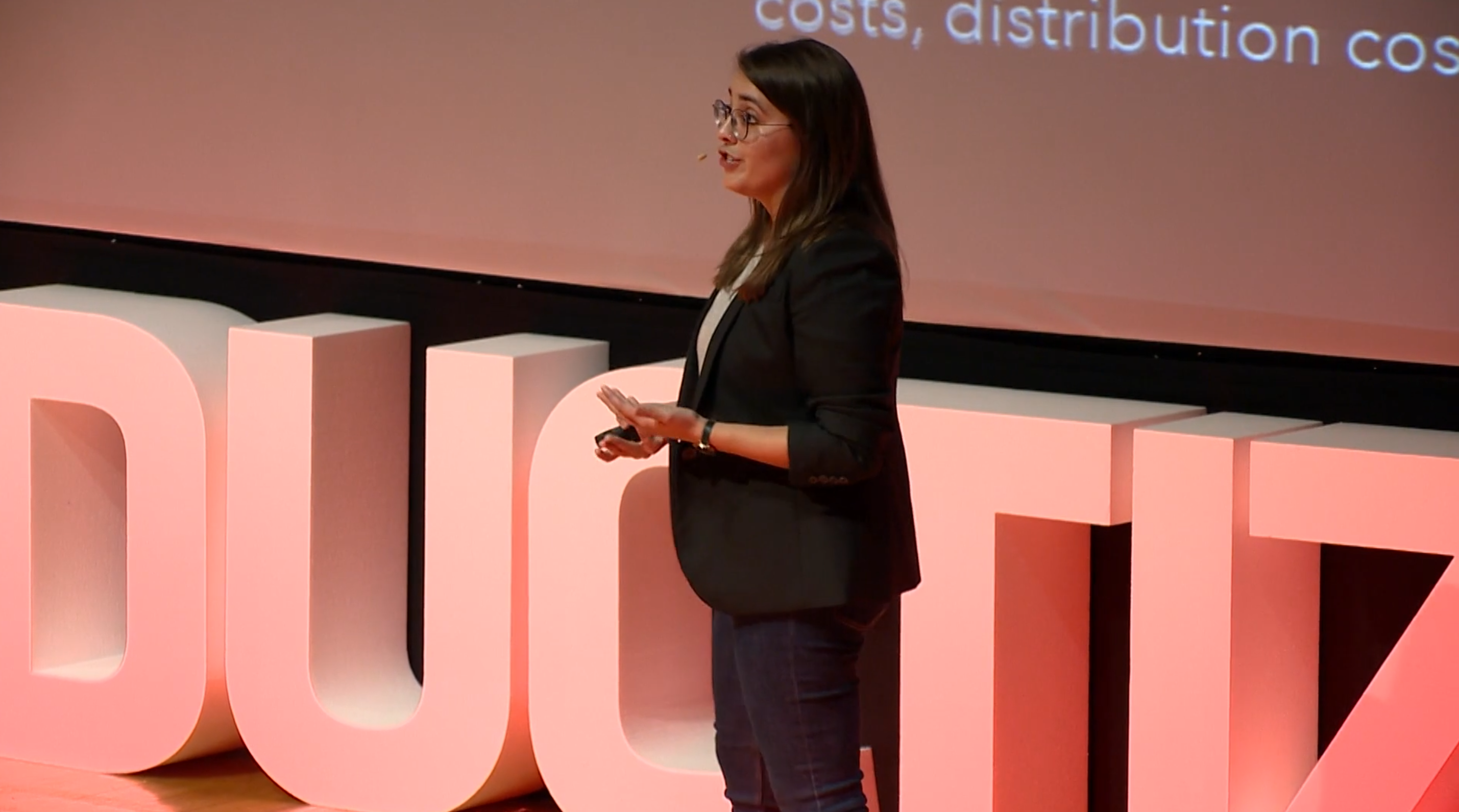Below is an interview of Emily Batt, who graduated Northeastern’s College of Science in 2012 with a degree in physics. Following college, Emily worked for Fikst, an engineering consultancy, and then KAYAK, as a product manager. As she gained work experience, the announcement of a new MS/MBA program at Harvard University caught her attention, motivating Emily to return to school. This summer, she will be interning for Google, joining the product management team in the Bay Area.
Can you briefly explain your time at Northeastern?
I attended Northeastern from 2007 to 2012. I started undeclared, and ultimately studied physics. I did three co-ops, was a part of a bunch of student groups—hey Tastemakers!—and lived both on- and off-campus. As an alum, I’ve stayed involved through IDEA and the MMXI Scholarship.
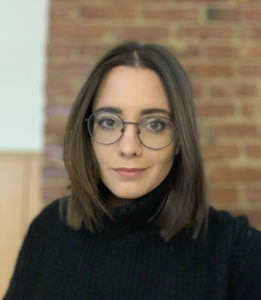
Photo courtesy of Emily Batt.
You came to Northeastern as undeclared. What influenced your decision to major in Physics?
Initially, it was serendipity. I overheard someone recommend The Elegant Universe when I was buying my laptop for college—I went to the bookstore and picked it up right away, and that planted the seed. But I hadn’t loved math classes in high school, and I couldn’t imagine studying physics full-time. I had this notion it was formulaic and rigid, and I was drawn to more expressive fields.
I spent my first year at Northeastern filling my core requirements and exploring different majors. I think I declared two or three along the way. But at some point, I realized the rarity of the opportunity at hand: every day I was surrounded by world-class researchers, whose job was to teach me their craft. I wanted to capitalize on that and learn from them what I was least likely to ever teach myself: physics. It was hard, and I struggled often. But I also surprised myself. I learned the satisfaction of finishing problem
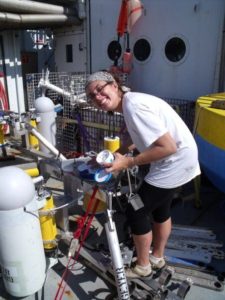
Emily working on the R/V Sharp during her first co-op at Oregon State. Photo courtesy of Emily Batt.
sets cover-to-cover, of wearing down a stick of chalk to my fingertips, and of wading through ambiguity towards a solution. By the time I graduated I realized physics was not prescriptive, it was profound. And I’m still grateful I was able to combine my science and engineering courses with classes in creative writing and religious history and modern art and voice lessons. I loved the breadth of the academic exploration I was able to achieve at Northeastern.
Having done three Co-ops, how has that experience helped you to determine what you wanted to pursue after Northeastern? Did this experience show you what you liked, what wasn’t a perfect fit?
Absolutely. My first co-op was in physical oceanography research at Oregon State University. I learned computer programming and spent time at sea on a research vessel; I loved the hands-on science and in-depth problem solving. My second co-op was also academic, in network science research at the Dana-Farber Cancer Institute and the MIT Media Lab. The energy in both institutions was electric. For my final co-op, I pursued engineering roles to better understand industrial applications of basic science. I ended up at Fikst Product Development, and it was the perfect fit: hands-on, creative, challenging, team-oriented, fast-paced. I loved it and I stayed on for another four years.
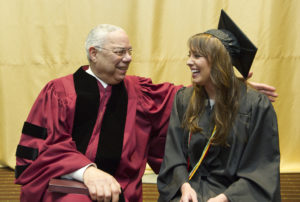
Emily was a student commencement speaker in 2012. Here, she is pictured meeting with Colin Powell at commencement. Photo courtesy of Emily Batt.
Are there any specific memories from your time at Northeastern that had a lasting impact on you?
I will never forget the Husky Hunt. The best my team ever earned was fourth place, but I still have memories of spray-painting our team shirts and biking around Somerville at 3am and chasing Mayor Menino for a photo and unwrapping hundreds of fortune cookies for extra points. We used to choose our team name by clicking the random-Wikipedia-page-generator, so, long live Team “List of Settlements in Iceland!”
Can you explain what working at Fikst was like? How did you go from working as an engineer, to then working at KAYAK as a product manager?
Fikst is an engineering consultancy that specializes in solving tough technical design problems through rapid prototyping and iteration—think tools like 3D printing and laser-cutting. I was able to work on some incredible projects there, like developing an instrument for detecting counterfeit malaria pills, crafting a manufacturing system for microfluidic chips, building a hollow fiber water filtration platform, and designing a really precise golf ball squisher. I loved the process of translating an idea into a physical product through experimentation, and I loved learning about new fields in a tactile, hands-on manner.
Eventually, I became curious about the ways in which data could be folded into the product design process. When you build a piece of hardware, the story ends when you hand it to the user: you don’t know how they interact with it and whether it’s meeting their needs. I was eager to learn about the connected digital world, and ways in which data could extend the product development lifecycle beyond the point of customer hand-off. At KAYAK, I ultimately ran a product team at the intersection of the engineering, business, and design. I loved being a part of each of those worlds simultaneously and working on projects with appreciable and immediate business impacts. The transition from hardware to software wasn’t always smooth, and I spent a lot of time swimming in acronym alphabet soup. But beyond the jargon, many of the problem-solving skills were the same. I took classes at General Assembly to learn some of the hard skills, and I was lucky to have the support of a patient and generous team. But I also believe in the power of “beginner’s luck.” When you come to a new field, you bring a fresh perspective and a curiosity that can help re-examine entrenched practices.
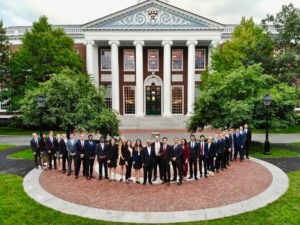
MS/MBA class with HBS Dean Nohria. Photo courtesy of Emily Batt.
What made you realize you wanted to return to school and pursue a Masters degree?
I love learning, so part of me always expected to return to graduate school. But I was lucky to find jobs where I was constantly learning, so that need never felt unfulfilled. When Harvard announced the new MS/MBA program, it prompted me to reconsider graduate school. I had seen a host of really interesting business problems at KAYAK, and I wanted to understand how other firms contended with the same challenges. Being able to get that big-picture perspective without compromising the technical rigor I’d cultivated in my career was compelling. Plus, I was excited to be a part of the inaugural class, and to have a role in shaping the program.
This summer you will be interning at Google. Can you explain what that will be like? Who are you working under or with?
I’ll be joining the product management team in the Bay Area. To me it’s still a little unfathomable to be at a company of 100,000 people, but I’m excited to see product development through the lens of a firm with nearly unlimited resources, users, and data. What does this advantage look like day-to-day, and what does it mean for smaller firms trying to compete? I’m excited to understand Google’s approach to leadership and technical excellence.
What do you do for fun outside of class/work?
I love the arts, being outside, skiing, hiking, visiting breweries with friends, traveling. My favorite spots in New England are western Massachusetts and coastal Maine; my favorite spot in the world is in the Swiss Alps, where I worked on an organic farm the summer after college graduation.
And finally, what is your key piece of advice for anyone attending Northeastern?
Self-advocate: Northeastern is vast and has a wealth of resources, but they can be difficult to navigate. Don’t be afraid to ask for what you want and to craft your own path. Be authentic: college is tough, and you should feel empowered to express vulnerability and seek help. During my time at NU, I opened up to a professor about some health issues my family was facing; she became a really valuable advocate for me and a partner in my education. And finally, surprise yourself: explore something totally outside your comfort zone and try to keep your options open.
